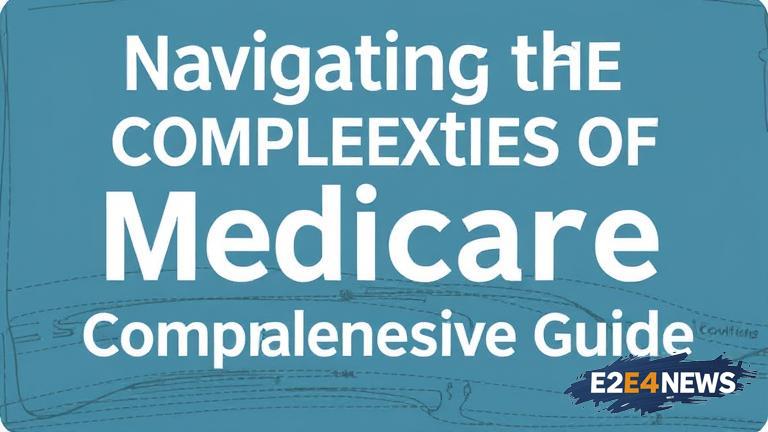Medicare is a federal health insurance program that provides coverage to millions of Americans, including those 65 and older, as well as certain younger individuals with disabilities. The program is divided into several parts, including Part A, which covers hospital stays, and Part B, which covers doctor visits and other medical services. Additionally, Medicare Part C, also known as Medicare Advantage, offers an alternative to traditional Medicare, while Part D provides prescription drug coverage. With so many options available, it can be challenging for individuals to navigate the complexities of Medicare and choose the best plan for their needs. Furthermore, the program is subject to change, with new laws and regulations being implemented regularly. For instance, the Medicare Access and CHIP Reauthorization Act of 2015 made significant changes to the program, including the introduction of new payment models and quality measures. Moreover, the Centers for Medicare and Medicaid Services (CMS) has implemented various initiatives aimed at improving the quality and efficiency of care, such as the Quality Payment Program. Despite these efforts, many individuals continue to struggle with understanding their Medicare options and making informed decisions about their coverage. This can lead to confusion, frustration, and even financial difficulties. To avoid these pitfalls, it is essential for individuals to educate themselves about Medicare and seek guidance from trusted sources, such as licensed insurance agents or Medicare counselors. By doing so, individuals can ensure that they are making the most of their Medicare benefits and receiving the care they need. In addition to understanding the different parts of Medicare, individuals should also be aware of the various enrollment periods, including the Initial Enrollment Period, the Annual Election Period, and the Special Enrollment Period. Each of these periods has its own set of rules and deadlines, and failing to enroll during the correct period can result in penalties and gaps in coverage. Moreover, individuals should be mindful of the costs associated with Medicare, including premiums, deductibles, and copays. While Medicare provides comprehensive coverage, it is not free, and individuals must budget accordingly. To help with these costs, many individuals rely on supplemental insurance, such as Medigap policies, which can help fill the gaps in Medicare coverage. However, these policies can be expensive, and individuals must carefully consider their options before making a decision. In conclusion, navigating the complexities of Medicare requires patience, persistence, and a willingness to learn. By taking the time to understand the program and seeking guidance from trusted sources, individuals can make informed decisions about their healthcare coverage and ensure that they are receiving the care they need. With the right knowledge and support, individuals can overcome the challenges of Medicare and enjoy a healthier, more secure retirement. The Medicare program is a vital component of the US healthcare system, providing coverage to millions of Americans. As the program continues to evolve, it is essential for individuals to stay informed and adapt to the changes. By doing so, individuals can ensure that they are making the most of their Medicare benefits and receiving the care they need. The importance of understanding Medicare cannot be overstated, as it has a significant impact on the health and well-being of millions of Americans. As such, it is crucial for individuals to take an active role in their healthcare and make informed decisions about their coverage. With the right guidance and support, individuals can navigate the complexities of Medicare and enjoy a healthier, more secure retirement. The future of Medicare is uncertain, with ongoing debates about the program’s funding and structure. Despite these challenges, the program remains a vital component of the US healthcare system, providing coverage to millions of Americans. As the program continues to evolve, it is essential for individuals to stay informed and adapt to the changes. By doing so, individuals can ensure that they are making the most of their Medicare benefits and receiving the care they need. In the end, understanding Medicare is crucial for individuals who want to make informed decisions about their healthcare coverage and ensure that they are receiving the care they need.
